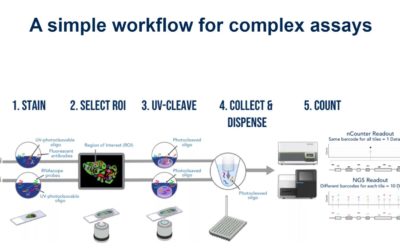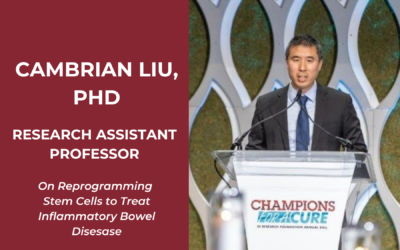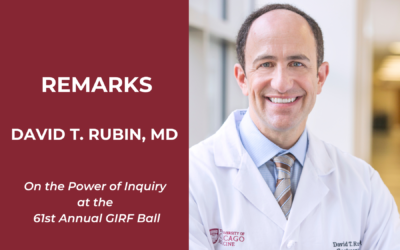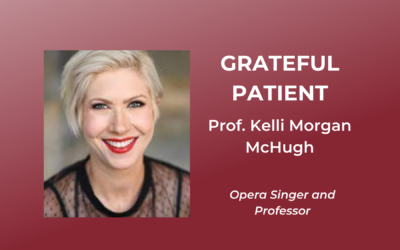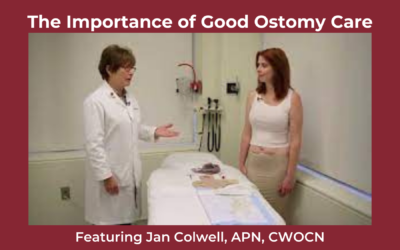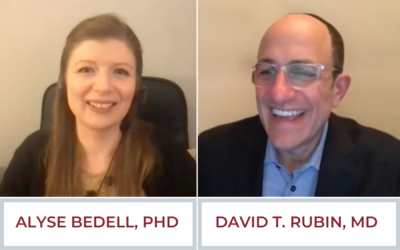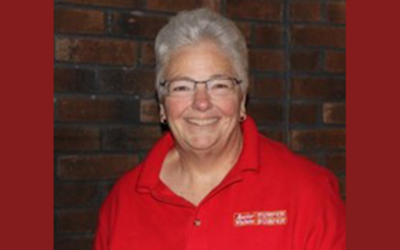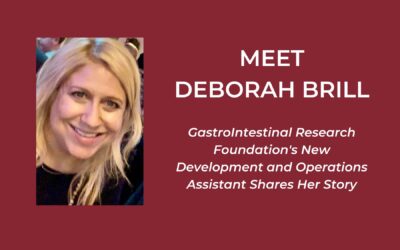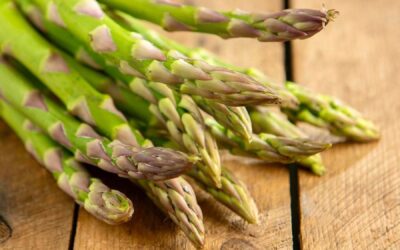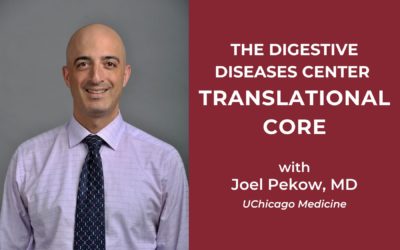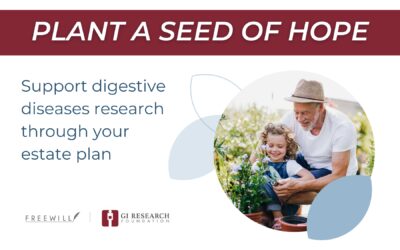Newsroom
Spotlight on Research
ANNOUNCEMENT: GI Research Foundation Launches NEW Cancer Cure Funding Initiative
The GI Research Foundation is proud to announce the CA CURE...
Research Spotlight: How Do We Assess Cancer Risk, and Prevent Cancer, and Improve Mortality? Featuring Sonia Kupfer, MD
Explains Kupfer, “Number one, we want to understand better how some of these chemopreventive agents are working. For example, there is good clinical-trials data that aspirin prevents colon cancer, specifically in Lynch syndrome. Now, we can look at how it works, and target those pathways. Secondly, we can determine who may respond best to which therapy, or who may have more response, and use that information to build more robust treatments. That’s the big vision here. But it’s early days right now.”
New Equipment Funded by the GI Research Foundation at the 61st Annual Ball
GeoMX Digital Spatial Profiler “Like being inside a tissue...
Research Spotlight: Cambrian Liu, PhD, On Reprogramming Stem Cells to Treat Inflammatory Bowel Disease
Explained Dr. Liu, “Consider that a disease flare is like a forest fire, and the drugs we have in our arsenal are firefighters. What no drug does currently is focus on the restoration of the intestine after a flare.”
Research Spotlight: Sonia Kupfer, MD, the Role of Bile Acids in Colorectal Cancer Disparities
“In order to achieve our goal of reducing the burden of GI cancers, we practice and strive for early detection and personalized medicine. Personalized medicine moves away from one-size-fits-all approaches, and integrates knowledge about a person’s genetics, personal and family history, and environmental risk factors, to provide tailored care to the individual.”
David T. Rubin, MD on The Power of Inquiry at the 61st Annual GIRF Ball
“GIRF has, as it always has, kept its eyes on the bigger picture as we have worked to develop our largest endeavor ever: our regenerative medicine program. As mentioned briefly last year during this Ball, regenerative medicine is the study of how tissues develop and mature into different organs, and how tissue injury occurs and changes with age or disease can be repaired or replaced. The potential applications for such a program are incredibly exciting, and may include tissue healing in inflammatory bowel disease, and organ regeneration in intestinal, liver, or pancreas failure conditions. Ultimately, these discoveries will yield new insights and treatments for GI cancer as well.”
Patient Story: Prof. Kelli Morgan McHugh, Opera Singer and Professor
Explains Prof. McHugh, “In hindsight, I’m a person who is always going go to get up, take care of my kids, go to work… I’m going put on some lipstick and I’m going to do my best. But maybe part of the psychology of [a digestive disease], an invisible disease, is that people are accustomed to hiding it. But you have to get past that. I wish I’d gone to [Dr. Dalal], and that I had trusted my gut sooner about not getting the right care.”
2022 Ball Honoree: Ira Hanan, MD, Reflections on a Lifetime of Service
Dr. Hanan’s clinical expertise has helped thousands of patients with a variety of GI concerns and caring for patients was always the centerpiece of his work. “The most gratifying thing is seeing people get better,” he explains. “When they come to you, they’re sick. You give them a treatment plan, you listen to them, and they are getting well again. Now, when patients learn I’m retiring and leaving, I hear them say, ‘You’ve made such a change in my life.’ And that is what it’s all about.”
Classic Chicago Magazine – Champions for A Cure : Saturday, June 4th, 2022 The GI Research Foundation Annual Ball
Article by Jill Lowe So many of us have a loved one, know...
The Importance of Good Ostomy Care, featuring Janice Colwell, Advanced Practice Nurse , Ostomy Clinic Director, The University of Chicago Medicine
Life with an ostomy is often a net-positive change for patients...
Webinars Discuss New Treatment Options and Mental Health and IBD with David T. Rubin, MD and Alyse Bedell, PhD
The advent of new therapies also raises questions about which treatments are most effective for different kinds of patients and disease states. Dr. Rubin reviewed the most recent science about these treatment options, and how physicians decide among medical therapies for their patients.
Patient Profile: Shelly Miller “It’s important for me to give back wherever I can.”
Explains Miller, “Jan [Colwell], God love her, she just kept sticking with me and advocating for me. She went back and she said, ‘We cannot leave this 50-something year old woman, in the prime of her life and her career, in a place where she can’t work again, and she can’t live her life.’” Following corrective surgery for Miller’s stoma, she was able to make a full recovery without further complications.
Other Recent News
2023 GastroIntestinal Research Foundation Competitive Grant Cycle Awards
Through our annual competitive grant awards program, the GastroIntestinal Research Foundation provides initial “seed” funding to select novel projects that allow investigators to pursue new and exciting paths that may not otherwise ever receive attention. Using robust scientific and lay review, in the 2023 cycle, the GI Research Foundation awarded $550,000 to six investigators at the University of Chicago for novel research projects.
2023 Associates Board Young Investigator Awards
Founded in 1997, the GI Research Foundation’s Associates Board is made up of professional volunteers and emerging leaders united by determination and dedication to educating our communities on the prevention, treatment, and cures for digestive diseases. This year, the Associates Board awarded a record $40,000 to four University of Chicago grant recipients.
Meet Deborah Brill: GastroIntestinal Research Foundation’s New Development and Operations Assistant
My name is Deborah Brill and I am thrilled to be a part of the G.I. Research Foundation team as the Development and Operations Assistant.
All-Star Challenge Foursomes Available
Join us for a great day on the greens! The GI Research Foundation presents the Larry A. Pogofsky All-Star Challenge on Monday, August 7th at Bryn Mawr Country Club in Lincolnwood, Illinois. The All-Star Challenge honors Larry’s love for sports and continues his legacy of funding groundbreaking digestive diseases research. For more information, please contact bzelwin@girf.org.
Gut-Friendly Recipe: Asparagus and Spring Greens Farro Hash with Miso Dressing
Farmer’s markets and roadside stands are beginning to fill with summer treats, and the first swoon of the season is often reserved for fresh, local asparagus. A wonderful side dish on its own, asparagus (actually a grass related to alliums) is a potassium powerhouse and a good source of protein and fiber.
Visceral: Podcast Episode – IBD or IBS…or Both? (episode 4)
Confusingly, similar acronyms describe two very different conditions of the lower GI tract: IBD (inflammatory bowel disease) and IBS (irritable bowel syndrome). IBD is often treated with biologic medical therapies that are infused, injected, or taken orally.
The Digestive Diseases Center Translational Core with Joel Pekow, MD
One of the most important and enduring contributions of the GI Research Foundation (the Foundation) may also be one of the least well understood. For a decade, the Foundation has supported the Digestive Diseases Center (DDC) Translational Core, an engine that drives transformative research and scientific discovery for all investigators at the University of Chicago.
Plant a Seed of Hope – Support Digestive Diseases Research Today
As we embrace the spring season, we are reminded of the power of growth and new beginnings. At the GI Research Foundation, we are committed to planting the seeds of hope for those affected by digestive diseases. Please take 20 minutes today to protect what’s important to you and consider making a planned gift to join us in this crucial mission.
Eating Restriction and Inflammatory Bowel Disease, with Courtney Schuchmann, RD
Everyone has overindulged or eaten a food that didn’t agree with them. For most people, this means that the next time they are offered spicy chili or rich dessert, they politely decline or make a different choice. But for patients with Crohn’s disease and ulcerative colitis, this experience can be all too common—if nearly every time you eat anything, it hurts, limiting what foods you eat makes sense. But it can also be a slippery slope, leading to extremely restricted approaches to food.



